

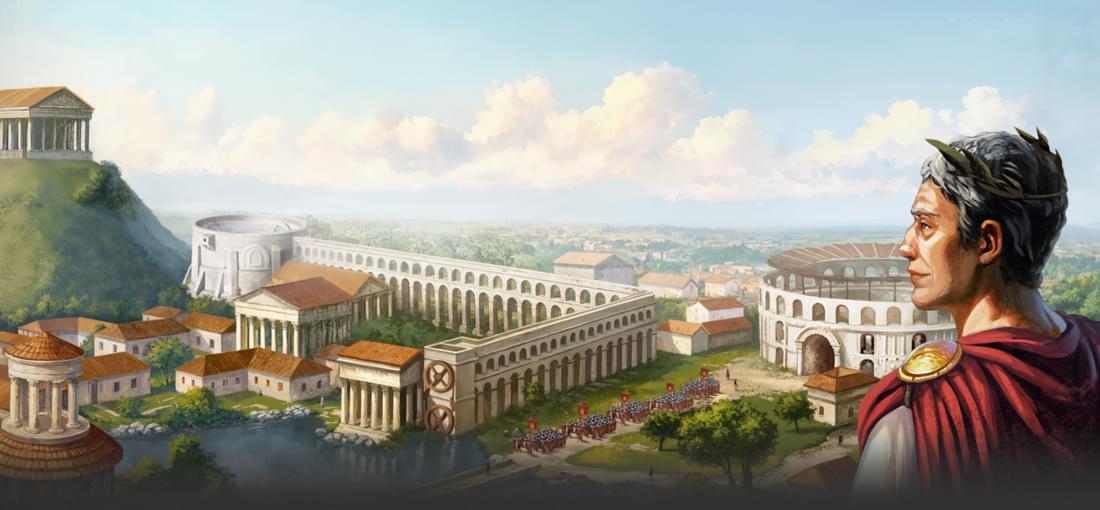
While this game looks like it's a spiritual successor to the old Impressions games (Caesar/Pharaoh/Zeus/Emperor), and in a sense, it is, it is certainly not a direct copy. I'd say it's mostly Caesar, with some Anno (you need for produced materials for building, not only denarii; buildings have well-defined areas of influence) and a very little Farthest Frontier (you need to surround houses with beautification to ensure high desirability) mixed in. To give an overview of the game without referring to other games, the game is about building Roman cities and ensuring your citizens prosper. You start the game by building a forum (to which everything needs to be connected by roads), some plebeian housing to have workers, then setting up some initial infrastructure, raw material production buildings and wheat farms, then, once you reach prestige level 2 (you always reach higher prestige levels by having a set number of plebeians and patricians), some patrician housings so that you have a tax income. Then, you keep building houses, farms, good production buildings and services as your citizens' needs increase as their homes upgrade. You also have to keep the gods happy to earn their blessings and avoid their wrath. There is also a (surprisingly involved) military component, where you have to recruit soldiers, equip them with weapons and armor and send them into battle, where you can even give them basic commands. I find the game's systems work quite well together, the whole gameplay is rather smooth and rewarding. The only con I see so far is that the religion system feels tacked on (basically, have one temple per god, then make sacrifices to whichever's blessing you need). Also, while these are not really cons, it's worth mentioning that the game lacks the charm of the old Impressions games (no clicking on walkers to read their thoughts) and that the game's scope is rather small, being played in games, and needing only a handful of citizens living in your "city".

In Bus Driver Simulator, you get to drive a bus in one of two cities, one in Russia, one in Germany. On the plus side, the game really is charming. While its graphics are obviously not made with an AAA budget, they are well-crafter, with a noticeable, loving attention to detail. This is true both for the buses, of which each is modeled after a real-life equivalent, and the cities, with the various neighborhoods being distinct enough. It's also nice that you can either play "career", driving either pre-made routes or ones you make yourself, setting how long you have to reach each stop and even what time it is, or "scenarios", where all parameters are pre-set and you have to earn a certain amount of money to succeed. (Obviously, you get money from ticket sales but are fined for collisions, arriving too late, departing too early, driving off the road, etc.) And it really is quite chill, driving around in a big bus. On the minus side, unfortunately, the game is rather weak, tech-wise, with some serious bugs and lack of foresight possibly ruining your enjoyment. With certain route/bus combinations, you can actually get hopelessly stuck on tree branches hanging onto your lane; it sometimes happens that the game doesn't recognize that you have arrived at the last stop (the rectangle indicating where to park remains green and passengers stand up but don't get off, but if you try to leave the stop, you get the "missed stop" penalty), making the route unable to finish; sometimes, AI cars stop at an intersection as if there was a red light even if there is no traffic light at all... All in all, I think the game is worth its introductory price, or a similar one, if it gets a discount later on, but not its full price.
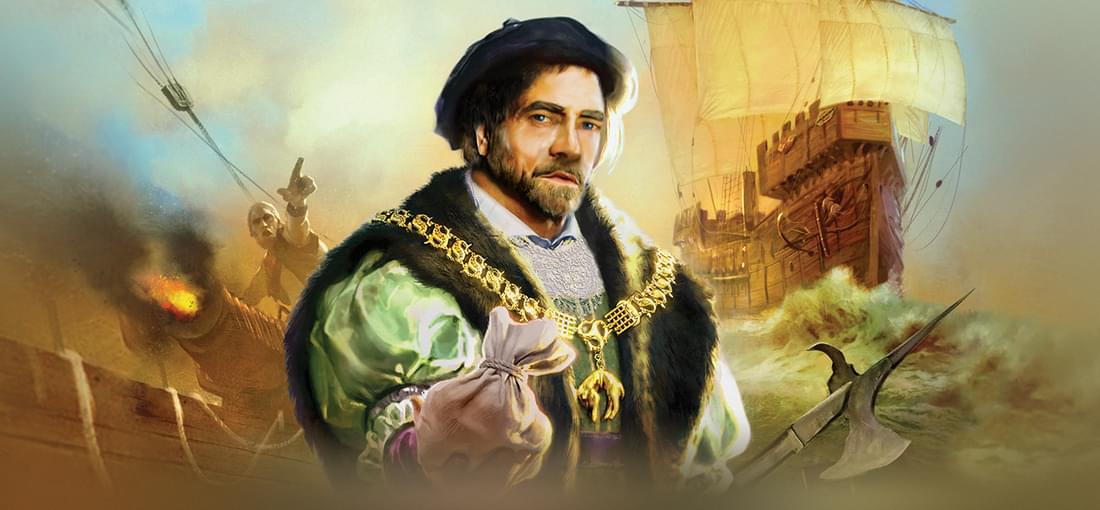
In Patrician 4, you take on the role of an aspiring trader in 14th century Northern Europe, doing business in the Hanseatic League's many cities. You start off with modest wealth, which you try to increase by buying low and selling high, first buying whatever the various cities have available and taking them to other cities, then eventually building your own production buildings to supply the cities with your own goods. As you do so, you also earn the respect of the cities' burghers and can even run for the title of mayor, and, if your become one of the top merchants of the whole Hanseatic League, even that of the Alderman, the president of the League, who has access to special privileges. There is also combat, but it's definitely not the focus of the game. What's hot +Relatively complex trading simulation that not only builds on supply and demand but also has events impacting prices. Also, there are regional goods, which is cool. +Climbing the social ladder is interesting and reaching new levels is meaningful, requiring you to have wealth, ships and employees. +The game aged quite well, while the graphics are somewhat dated, the gameplay is still solid. What's not -When you start to become a threat, your rivals in the city (mostly the incumbent mayor) start sabotaging your businesses. While it's understandable, there is unfortunately no way to prevent this. -Even worse, each region has a prince whose mood constantly decreases and has to be appeased by gifts he occasionally demands. The problem is that these demands come very rarely and unless you check in every few days, it's very easy to miss them. But even if you do appease them, it's usually not enough to restore their mood to 100%. Also, you can only do these quets when you have a high enough rank. This all leads to you being powerless to stop thhe princes' sieges of the cities most of the time, severely hurting the mid-to-late game.
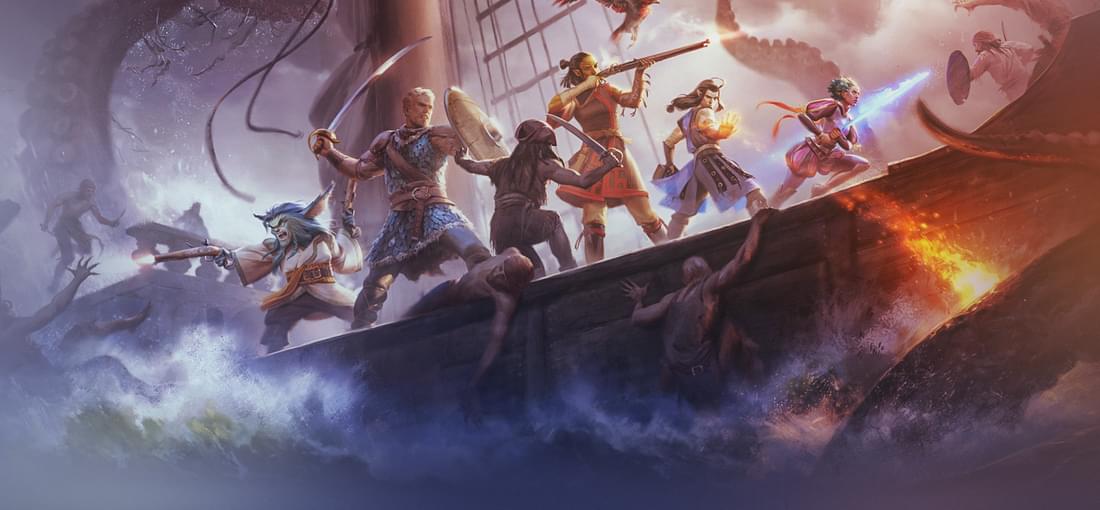
The soundtrack is superb, but I miss the days when GOG gave soundtracks and other goodies by default when you bought a game. Granted, it was with old games, but it was even the whole point of one of their commercial videos. Still, the soundtrack is really good, so on its own, that would merit 5 stars.
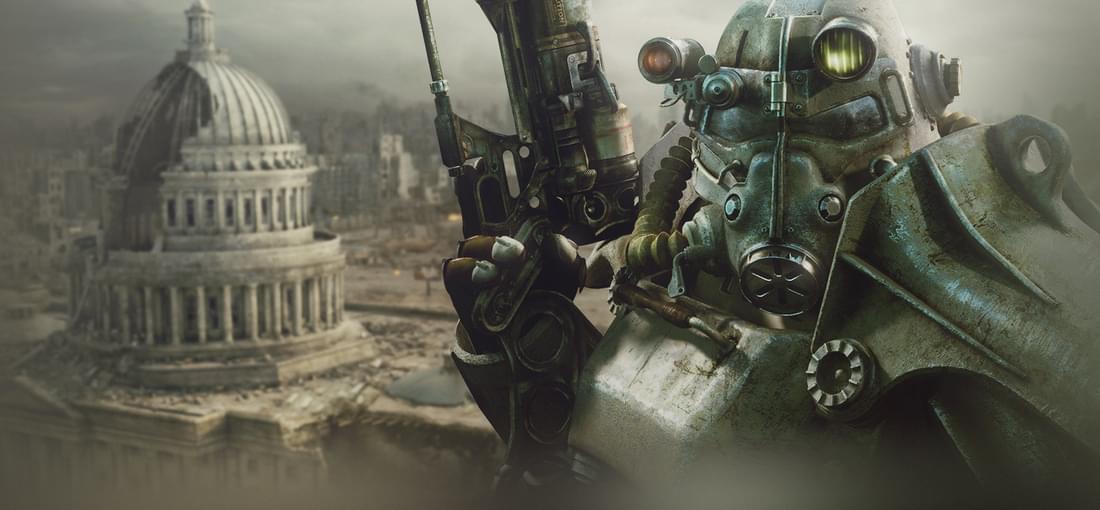
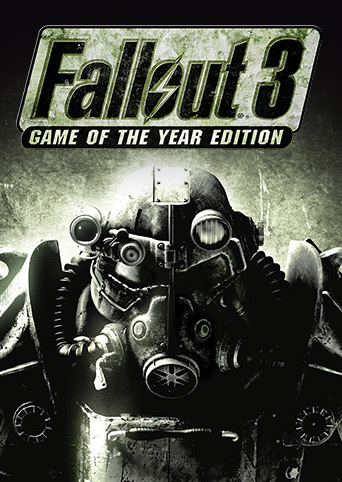
This game was kind of hailed as one of the best games ever made when it was released, but since then it gets much more negative feedback for not being a "true fallout game". It has some strong points and weak points, but I think all in all, it is a decent game. Case in point: even though I already have it on Steam, I will also buy it here. I'm considering this game based on its own merits, any comparisons to other Fallouts will only come in the section describing aspects which can be interpreted as either good or bad. The good 1. The atmosphere. You really get that post-Great War feeling from the wasteland and its inhabitants trying to get ahead despite the grim harshness of the world. 2. The locations and characters are usually quite well made, and some really stand out - for example, in my opinion, Tranquility Lane is one of the most unique locations I've seen, especially considering its "origins". Its creator is also a one-of-a-kind character, who REALLY deserves their potential fate (not going into specifics to avoid spoilers). 3. The real-time combat enhanced by VATS is a well-working concept. The bad 1. Large part of the map feels very linear due to small overland areas being connected by subway lanes, severely restricting potential movement. 2. By the end of the game, one can have a ridiculously overpowered character even without trying because certain perks make combat totally one-sided. The decide-for-yourself 1. The story has a (for a Fallout game) unusually black-and-white morality with one side being THE good team and the other THE bad team. No ambiguity whatsoever. 2. Enemy scaling is in full swing, meaning they are ALWAYS at your level. 3. The game did take a big step in the action direction from the previous Fallout games. Personally, I think it's a very good game - for one playthrough or two, but it didn't have that "let's play this through again right now" captivating feeling for me.
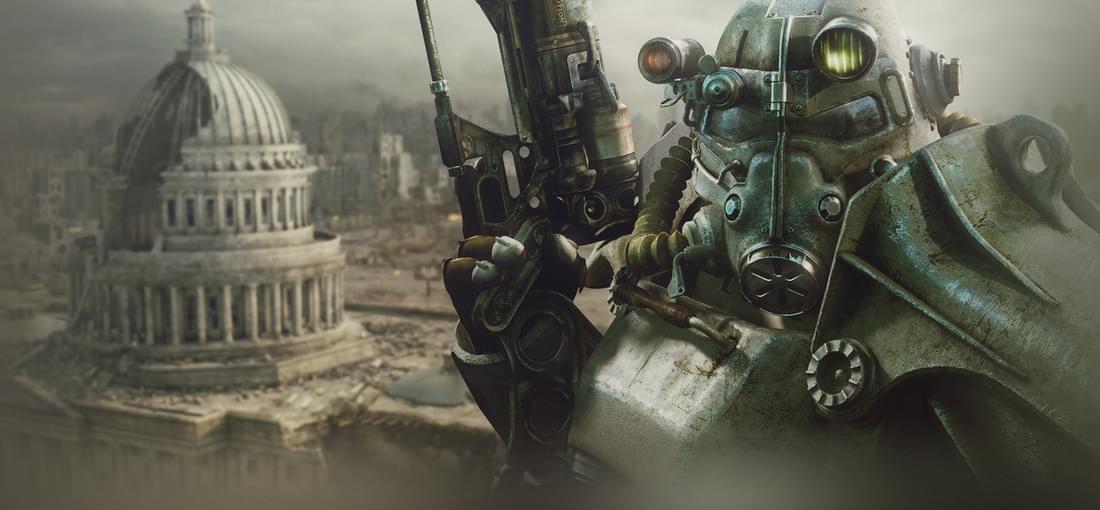
This game was kind of hailed as one of the best games ever made when it was released, but since then it gets much more negative feedback for not being a "true fallout game". It has some strong points and weak points, but I think all in all, it is a decent game. Case in point: even though I already have it on Steam, I will also buy it here. I'm considering this game based on its own merits, any comparisons to other Fallouts will only come in the section describing aspects which can be interpreted as either good or bad. The good 1. The atmosphere. You really get that post-Great War feeling from the wasteland and its inhabitants trying to get ahead despite the grim harshness of the world. 2. The locations and characters are usually quite well made, and some really stand out - for example, in my opinion, Tranquility Lane is one of the most unique locations I've seen, especially considering its "origins". Its creator is also a one-of-a-kind character, who REALLY deserves their potential fate (not going into specifics to avoid spoilers). 3. The real-time combat enhanced by VATS is a well-working concept. The bad 1. Large part of the map feels very linear due to small overland areas being connected by subway lanes, severely restricting potential movement. 2. By the end of the game, one can have a ridiculously overpowered character even without trying because certain perks make combat totally one-sided. The decide-for-yourself 1. The story has a (for a Fallout game) unusually black-and-white morality with one side being THE good team and the other THE bad team. No ambiguity whatsoever. 2. Enemy scaling is in full swing, meaning they are ALWAYS at your level. 3. The game did take a big step in the action direction from the previous Fallout games. Personally, I think it's a very good game - for one playthrough or two, but it didn't have that "let's play this through again right now" captivating feeling for me.
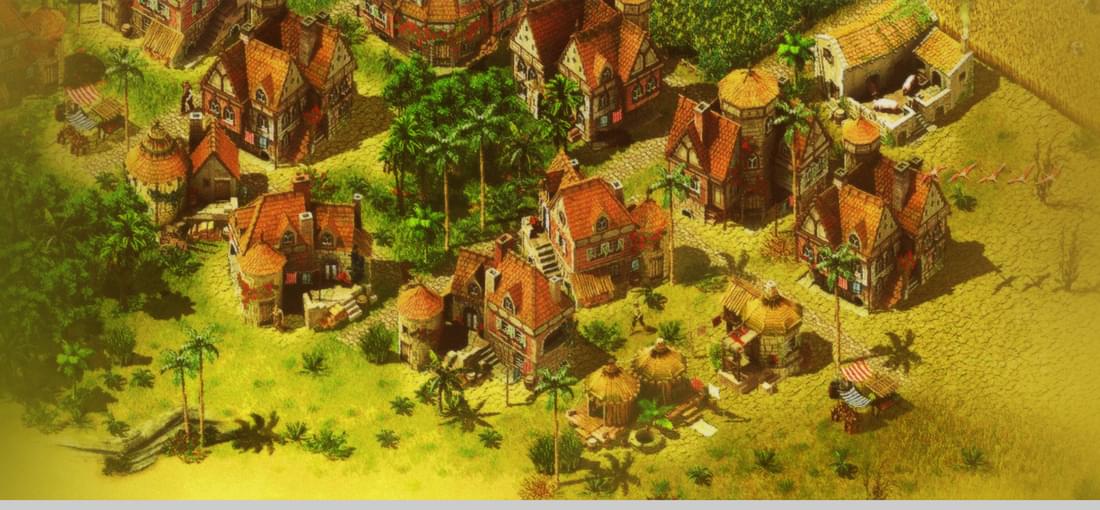
Port Royale 2, like its predecessor, is set in the Caribbean of the XVII century. It is an age and place where one can earn large sums of money if he's got the right skills and knows how to put them to good use... or lose the same amount of money if he doesn't pay attention to the events enfolding around him. It is part of a series of games developed by Ascaron Entertainment, consisting of the Patrician and Port Royale games, and if you haven't played any of them previously, this is probably the best one to try first, as it is a fair bit easier than any of the other games. Basically, the premise of the game is this: you get a ship and a certain amount of money, and you're free to do with it as you please. And there are a number of things to with it, but first, you'll most likely have to stick to trading. There are 20 types of goods (divided into five categories, namely basic goods, raw materials, products, colonial goods and import goods) in the game, you can trade in any of them, and, if you know where to buy them cheap, can make quite a fortune. Every settlement in the region has certain goods it produces most efficiently, which is partly determined by its type - for example, colonial towns produce raw materials (such as corn), which have to be transported to the governor towns which make the appropriate finished product out of it (in this case, meat). The fact that you can only find raw materials and colonial goods in colonial towns and finished products and import goods in governor towns creates a strong dependency between the cities, and guess who has the (well-paying) duty of supplying towns with whatever they need? That's right, you, and your fellow traders! (This separation of towns into two categories is one of the reasons this game is easier than the first Port Royale or any of the Patrician games.) An interesting possibility players have is that of building your own business. That's right, with the proper money and raw materials, you can have your own plantations/industries running, provided you also bring some free settlers into the town from other places to work in them AND provide them with housing (which gives the game some extra depth). However, trading isn't the only way to invest your money. Once you have some wealth accumulated, you can invest in new ships, either to expand your trade empire or to wage battle on others. There is a fair number of ships in Port Royale 2, each with its own strengths and weaknesses, and you only have to choose one that suits your needs from those currently available in the port. The governors, mentioned already in the title, have very important roles. First, you can pick up missions from them. These come in a variety, from supplying a town with everything for a given amount of time, to capturing enemy fleets, to rescuing the governor's wife's puddle from an enemy city (no kidding!). These are a good source of income, and also increase your reputation with the country whose governor entrusted you with them. Higher reputation means the towns of the country will have more favorable prices for you. Since the era of the game isn't exactly a time of world peace, you can also buy letters of marque from the governors (which are an other way to blow your money, as they cost quite a bit, but can also yield high profits), meaning that you'll be their buccaneer, giving you the possibility of hunting down enemy ships without having to suffer global disdain for it. Above these, governors can give their daughters' hands to you in marriage, which means access to some exclusive pieces information (such as the prices of the four most sought goods in a certain country or the location the pirate who poses the greatest danger for the town was last spotted). As you accumulate your wealth, you gain ranks, meaning you can have ever more fleets and building permissions (needed to build buildings in a town). This is the other area where Port Royale 2 is easier than its related games: you only need money to advance in ranks. If you choose to do combat (either with pirates or an enemy nation), you just have to equip a good number of ships with powerful cannons and ammunition, then go hunting. Unfortunately, battles are quite a weak point of the game, because you can only ever have one ship under your command against a fleet of 1-5 enemy ships, with your other ships called in when the previous one is captured/destroyed/forced to flee. It doesn't mean battles are impossibly difficult (with the proper ships and tactics they are still doable), but it can get incredibly frustrating. The other not-so-great feature of the game is that once you have a considerable amount of money and very powerful fleets, it can get somewhat repetitive. Sure, you can always open new businesses and you have to pay upkeep after your ships, but it can still lead to a monotonous game experience. All in all, despite its shortcomings, Port Royale 2 is a very well-made and interesting sandbox-style game which gives players many things to do. I can recommend it to both new players of the genre and veterans who've played the Patrician games and/or Port Royale.